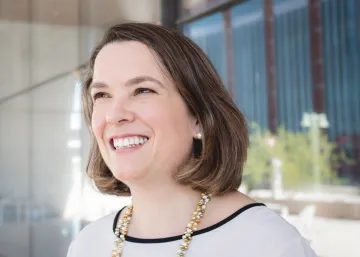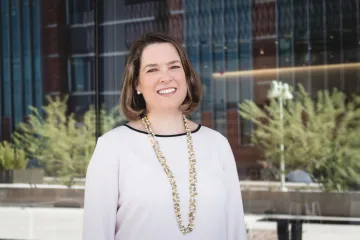Diversity & Inclusion Spotlight: Dr. Marion Henry
Marion Henry, MD, MPH, FACS, FAAP, is an associate professor of surgery and pediatrics with the University of Arizona.

Where are you from?
I am originally from Philadelphia, Pennsylvania. I came to Arizona via a long, winding road. I grew up in Pennsylvania. I went to high school and college in New Jersey. I subsequently went to medical school and started my residency in Northern California. Then I moved to New Haven, Connecticut, to pursue my research and the rest of my residency there. Before medical school, I became active duty Navy, so the Navy moved me to 29 Palms, California, for a year after residency to work as a general surgeon, then back to D.C. for two years for my pediatric surgery fellowship, and then to San Diego, California, for six years to serve as a general surgeon before I moved to Tucson.
What ultimately brought you to Tucson?
I came [to Tucson] because I was really compelled by the vision of the Department of Surgery here to be a place where people wanted to be, where people wanted to work, where people wanted to learn surgery, where people wanted to teach surgery, and where the patients and their experiences were really at the forefront of everything that motivated the department on a day-to-day basis. And I found a very diverse and inclusive environment that was something that really spoke to me.
What does diversity and inclusion mean to you?
Diversity and inclusion to me means having people of all genders, races, backgrounds, and experiences being welcome and included in the department and medical school. I think the more representative we can be of the world around us, the better we can be at understanding and caring for our patients. And I think diversity goes beyond just having men and women; it includes all varieties of gender identities, racial identities, ethnic identities, and also experiences that people have had, because we‘re defined so much by our pathways and our life experiences. Diversity goes into what people study and what previous careers they‘ve had. When I think about diversity and inclusion, there’s a lot more than just simple racial or gender categories to think about.
What makes you diverse?
I think in the field of surgery, just being a woman is a start of diversity, because a for a long time, there haven’t been many women in surgery. More than 50% of our medical school classes are women, but in many places, less than 20% if that of the [surgical] department is women. So, there’s still a gap there. And then, if you look at women in leadership positions in surgery, it’s an even smaller percentage. So, that’s the very first answer.
But for this population particularly, for our community, I‘m diverse because I grew up in the Northeast, and that’s different than many people around here. I think I bring my career in the Navy as another aspect of how my pathway has been different from others and what’s diverse about it, and that’s really important for this community because of the large Air Force and Army populations. My patients and their families love it when I understand the military life and the military terminology, and so that helps build connections.
Also, I was not a science major in college. I studied religion religious studies, not theology. So I learned about a variety of religions, and I think that having a different, less traditional pathway to medical school also lead to my diversity as I came through the medical field.
What are some of the obstacles you‘ve had to overcome on your personal journey?
I think some of the obstacles have come from not always having mentorship and sponsorship that has supported who I am, who I wanted to be, and where I wanted to go. As a resident, we did not have very many women in the department where I trained, and we did not have women in leadership. And the women we did have were not mothers. As a woman who envisioned getting married, having children, and yet sustaining a surgical career, hopefully with some leadership involved, I didn’t really have people within my immediate community to mentor me or to look to as role models. And for me, it was very important to get involved with the Association for Women Surgeons (AWS), where I could find those people and see that there were women who had done these things and succeeded in the things I was hoping to succeed in.
I faced challenges in my military career, again because I was a woman in a traditionally ‘masculine' field. I wasn’t just a woman in surgery, but now a woman in military surgery, and again, there are very few people who have taken that path. And I didn’t train within their system; I did my training outside of the military, and so that was yet another aspect of diversity that posed a challenge, because it was a different pathway than most people took. Anytime you do things differently, people sometimes raise their eyebrows and question whether you are as well-trained or successful, but I think that by always doing my best, working hard, and staying determined and strong, I‘ve proven I am.
What are some of the strengths your diversity has given you?

I think my diversity helps me to look at lots of different viewpoints and to avoid narrow thinking and biases. We all have biases, but I think the more experience you have and the more you‘re exposed to, the less likely you are to have them. I think that I‘ve brought all my life experiences and all of the things that I‘ve done that maybe weren’t the traditional way of doing them to the table. I‘ve found that when people have other careers or when they‘ve chosen different paths to study, they really enrich the discussion on whatever topic because they might have a new way of thinking, something that’s out-of-the-box, a new perspective to bring to the table. And I think that’s why diversity and inclusion are so important. Diversity really enriches every conversation we have, because you have many more viewpoints to consider. You don’t have people coming from the same background and perspective. The problem is thinking the same way. So ultimately, we end up with better answers.
What do you think is the importance of diversity and inclusion in surgery?
I think that our patient population is extremely diverse. The more we can reflect that diversity in our population of physicians and surgeons, the better care we can provide. And there are actually studies that have shown that. Patient care and patient experience are improved when there is a more diverse physician population. So I think it’s really critical that we continue to focus on that in medicine and surgery in particular. And then I think it also helps us as a whole community in medicine look at the bigger challenges in medical care with broader viewpoints. Because we face a lot of challenges in medicine right now, and we really need to come up with new ways of thinking, new ways of providing care. And the more viewpoints, the more diversity we have at the table to discuss these [challenges], the more we'll get bigger, better opinions and ideas to solve these problems.
In the business world, they‘ve shown that diverse companies do better. They generate greater revenue. So, I think in medicine that probably would translate over as well.
From a patient perspective, when patients see physicians who look like them or understand them, overall they'll be better able to ask their questions and take advice. And if we have a greater diverse population within the medical care community, we can understand some of the cultural issues and hopefully provide better care in that regard.
How do you hope to see the field of surgery become more diverse and inclusive?
I think we just need to keep working on it. And I think that it starts with really reaching out to all levels. If you can’t see it, you can’t be it. It’s a very popular catchphrase right now, but I think that’s really important. We have to introduce surgery to high school students, middle school students, maybe even elementary school students! We have to get out there in the population and show them that you can do this, you can be this. It means showcasing more of our Native American students and physicians so that we can show Native Americans that this is a possibility. It’s not just white people. It’s not just others. This is a world that is open to them as well.
And you have to be really deliberate about it. You have to make sure that all races, all genders, that people are sought out, that you‘re looking and not just accepting the first few names that come to mind. I think it takes always being mindful of ‘do we have a slate of candidates that are representative, that are diverse.' And it’s recognizing that that may mean that we have to broaden our criteria for things, and we have to look more at the journeys people have taken and recognize that it’s not the same road for everyone.

